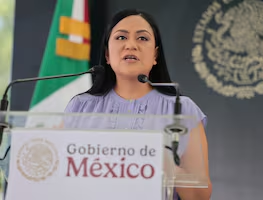Más Información

Sheinbaum anuncia obras de infraestructura en Nayarit; destaca puente que irá de Bahía de Banderas a Puerto Vallarta y un acueducto

Detienen a presunto jefe de célula delictiva allegada a Los Chapitos; se encargaba de narcomenudeo y compra-venta de armamento

“¡Arráncate, Coalcomán!”; así fue la campaña de Anavel Ávila, presuntamente ligada al “Mencho”, para Movimiento Ciudadano

Presupuesto para programas sociales está asegurado en la Constitución: Ariadna Montiel; destaca que se benefician a 320 mil nayaritas

Sheinbaum anuncia construcción de Farmacias del Bienestar en 2025; asegura habrá medicamentos gratuitos para personas vulnerables

“Corrupción se quedó en el pasado”, asegura Sheinbaum; afirma que gobierno no tocará recursos del pueblo
The government of Mexico will propose a new anti-drug approach at the Special Session of the General Assembly on the world drug problem (UNGASS 2016).
Mexico's proposal includes dealing with the issue as a public health problem in which individuals and not substances are what matter, as well as a new prevention policy.
Miguel Ruiz Cabañas, Undersecretary for Multilateral Affairs and Human Rights at the Ministry of Foreign Affairs (SRE), said that this will be Mexico's position at the Assembly, that will take place on April 19 in New York City.
He added that for Mexico “fighting drugs with a punitive approach” is not enough, and that it is necessary to have more balanced and integral policies.
Ruiz also said that Mexico wants to “guarantee a better access to controlled substances for medical and scientific purposes.”
Antonio Mazzitelli, representative of the United Nations Office on Drugs and Crime, agreed that the war on drugs declared 35 years ago must end, especially in certain circumstances.
Roberto Gil Zuarth (PAN), spokesman of the Senate, agreed that the prohibitionist and punitive policy has been a complete failure that has also involved enormous social costs.
He added that before the end of the current session Mexico's Congress could move forward on issues such as medicinal use of marijuana, raising the amount of marijuana that citizens are allowed to carry above 5 grams as well as the procedure to release of citizens convicted for crimes against health in some cases.




